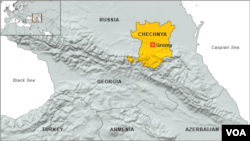MOSCOW —
Russian TV reported Friday that two ethnic Chechen brothers are suspects in terrorist bombings. But, for Russians, there was a new twist: the bombings were in Boston.
In recent years, ethnic Chechens were charged in bombings of the Moscow metro, a Moscow airport and a train from Moscow. But this time, Russian reporters fleshed out the biographies of two young Chechen men, Tamerlan and Dzhokhar Tsarnaev, suspected of attacks in the United States.
In Dagestan, a traditionally Islamic republic bordering Chechnya, school principal Temirmagomed Davudov said the Tsarnaev family came to Dagestan in 2001 from the Central Asian republic of Kyrgyzstan. During World War II, Stalin deported most of the population of Chechnya to Central Asia.
Davudov told reporters that the two brothers and their two sisters attended school for one year, in 2001, in Makhachkala, the capital of Dagestan. Then, he said, the family emigrated - apparently first to Turkey, then to the United States.
Separate lives
Oliver Bullough, Caucasus editor for the Institute of War and Peace Reporting in London, said that Chechen refugee groups often live in isolation, maintaining their traditions.
"The Chechens in Turkey, I know - I have been to several of their refugee camps,” he said Friday. “They live in total separate lives, ruled by their own people. There is no connection, really, to wider Turkish society."
When the Tsarnaev family left the Caucasus in 2002, Chechnya was in the middle of its second war of secession in one decade.
Chechen officials told reporters Friday that there was no evidence the family ever lived in Chechnya.
Jihadist videos
Andrei Soldatov, a security expert in Moscow, said he was surprised that American security officials failed to pick up on the jihadist music and video clips posted on a public YouTube site maintained for the last year by Tamerlan Tsarnaev, the older brother.
Soldatov said of the Chechen singer whose clips Tsarnaev posted: "He is quite radical. His song are mostly about jihad. The second category is clips, or, you might say accounts, of operations carried out in Dagestan."
Angry comments are filling a Russian social network account, on Vkontakte, belonging to Dzhokhar Tsarnaev of Boston. He lists his languages and English, Russian and Chechen, and his main interests as: “Chechnya and everything connected with the Chechen Republic."
Bullough, a frequent traveler to Chechnya, said the main tension in Chechnya is with Russia, not with the United States.
Alienation, not extremism
"I don't think there is an intrinsic anti-Western feeling in Chechen society,” he said. “Again, I would say this much more about two young men and about their own personal problems than about something ingrained in society."
On Friday, Ramzan Kadyrov, the leader of Chechnya, angrily dismissed any connection between his republic and the Tsarnaev brothers.
He posted on Instagram: "Any attempts to draw a parallel between Chechnya and the Tsarnaevs, if they are guilty, are futile. They grew up in the U.S., and their views and beliefs were formed there. The roots of the evil should be looked for in America."
In Chechnya, Kadyrov has imposed a conservative rule closely based on Islamic sharia law. Occasionally, he has blamed the region’s ongoing insurgency on Israel and the United States.
In recent years, ethnic Chechens were charged in bombings of the Moscow metro, a Moscow airport and a train from Moscow. But this time, Russian reporters fleshed out the biographies of two young Chechen men, Tamerlan and Dzhokhar Tsarnaev, suspected of attacks in the United States.
In Dagestan, a traditionally Islamic republic bordering Chechnya, school principal Temirmagomed Davudov said the Tsarnaev family came to Dagestan in 2001 from the Central Asian republic of Kyrgyzstan. During World War II, Stalin deported most of the population of Chechnya to Central Asia.
Davudov told reporters that the two brothers and their two sisters attended school for one year, in 2001, in Makhachkala, the capital of Dagestan. Then, he said, the family emigrated - apparently first to Turkey, then to the United States.
Separate lives
Oliver Bullough, Caucasus editor for the Institute of War and Peace Reporting in London, said that Chechen refugee groups often live in isolation, maintaining their traditions.
"The Chechens in Turkey, I know - I have been to several of their refugee camps,” he said Friday. “They live in total separate lives, ruled by their own people. There is no connection, really, to wider Turkish society."
When the Tsarnaev family left the Caucasus in 2002, Chechnya was in the middle of its second war of secession in one decade.
Chechen officials told reporters Friday that there was no evidence the family ever lived in Chechnya.
Jihadist videos
Andrei Soldatov, a security expert in Moscow, said he was surprised that American security officials failed to pick up on the jihadist music and video clips posted on a public YouTube site maintained for the last year by Tamerlan Tsarnaev, the older brother.
Soldatov said of the Chechen singer whose clips Tsarnaev posted: "He is quite radical. His song are mostly about jihad. The second category is clips, or, you might say accounts, of operations carried out in Dagestan."
Angry comments are filling a Russian social network account, on Vkontakte, belonging to Dzhokhar Tsarnaev of Boston. He lists his languages and English, Russian and Chechen, and his main interests as: “Chechnya and everything connected with the Chechen Republic."
Bullough, a frequent traveler to Chechnya, said the main tension in Chechnya is with Russia, not with the United States.
Alienation, not extremism
"I don't think there is an intrinsic anti-Western feeling in Chechen society,” he said. “Again, I would say this much more about two young men and about their own personal problems than about something ingrained in society."
On Friday, Ramzan Kadyrov, the leader of Chechnya, angrily dismissed any connection between his republic and the Tsarnaev brothers.
He posted on Instagram: "Any attempts to draw a parallel between Chechnya and the Tsarnaevs, if they are guilty, are futile. They grew up in the U.S., and their views and beliefs were formed there. The roots of the evil should be looked for in America."
In Chechnya, Kadyrov has imposed a conservative rule closely based on Islamic sharia law. Occasionally, he has blamed the region’s ongoing insurgency on Israel and the United States.





